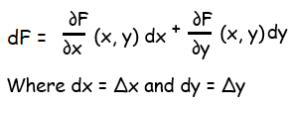LINEAR APPROXIMATION OF A FUNCTION OF SEVERAL VARIABLES
Subscribe to our ▶️ YouTube channel 🔴 for the latest videos, updates, and tips.
Let A = {(x, y) | a < x < b, c < y < d} ⊂ ℝ2 , F : A->ℝ and (x0, y0)∈A is defined to be
(i) The linear approximation of F at (x0, y0) ∈ A is defined to be

(ii) The differential of F is defined to be

Problem 1 :
If
w(x, y) = x3−3xy+2y2
x, y∈ℝ, find the linear approximation for w at (1,−1) .
Solution :
w(x, y) = x3−3xy+2y2
W at (1, -1)
w(1, -1) = 13−3(1)(-1)+2(-1)2
= 1 + 3 + 2
= 6
Finding ∂w/∂x :
Differentiate with respect to x.
∂w/∂x = 3x2-3(1)y+0
∂w/∂x = 3x2-3y
∂w/∂x at(1, -1) = 6 ---(1)
Finding ∂w/∂y :
Differentiate with respect to y.
∂w/∂y = 0-3xy+2(2y)
∂w/∂y = -3xy+4y
∂w/∂y at(1, -1) = -1 ----(2)
(x-x0) ==> (x-1)
(y-y0) ==> (y+1)
Applying the formula, we get
= 6 + (x2-3y) at (1, -1)(x-1) + (-3xy+4y) at (1, -1) (y+1)
= 6 + 6(x-1) + (-1) (y+1)
= 6+6x-6-y-1
= 6x-y-1
Problem 2 :
Let z(x, y) = x2 y + 3xy4, x, y∈ℝ.
Find the linear approximation for z at (2, −1) .
Solution :
z(x, y) = x2 y + 3xy4
z at (2, -1)
z(x, y) = 22 (-1) + 3[2(-1)4]
= -4+6
= 2
Finding ∂z/∂x :
Differentiate with respect to x.
∂z/∂x = 2xy+3(1)y4
∂z/∂x = 2xy+3y4
When x = 2 and y = -1
= -4+3
= -1
∂z/∂x at(2, -1) = -1 ---(1)
Finding ∂z/∂y :
Differentiate with respect to y.
Given : z(x, y) = x2 y + 3xy4
∂z/∂y = x2 (1) + 3x(4y3)
∂z/∂y = x2 + 12xy3
When x = 2 and y = -1
∂z/∂y = 4-24
= -20
∂z/∂y at(2, -1) = -20 ----(2)
(x-x0) ==> (x-2)
(y-y0) ==> (y+1)
Applying the formula, we get
= 2 + ∂z/∂x at(2, -1) (x-2) + ∂z/∂y at(2, -1) (y+1)
= 2-1(x-2)-20(y+1)
= 2-x+2-20y-20
= -x-20y-16
= -(x+20y+16)
Problem 3 :
If
v(x, y) = x2-xy+(1/4)y2+7
and x, y∈ℝ. find the differential dv.
Solution :
v(x, y) = x2-xy+(1/4)y2+7
∂v/∂x = 2x-1y+0
∂v/∂x = 2x-y
∂v/∂y = 0-x(1)+(1/4)(2y)+0
∂v/∂y = -x+(y/2)
dv = (2x-y)dx + (-x+(y/2)) dy
Problem 4 :
Let
W(x, y, z) = x2-xy+3sinz and x, y, z ∈ ℝ.
Find the linear approximation at (2, -1, 0).
Solution :
W(x, y, z) = x2-xy+3sinz
W at (2, -1, 0) :
= 22-2(-1)+3sin(0)
= 4+2+3(0)
= 6
Finding ∂W/∂x :
∂w/∂x = 2x-(1)y+0
∂w/∂x = 2x-y
∂w/∂x at(2, -1, 0) = 2(2)-(-1)
= 4+1
= 5
Finding ∂W/∂y :
x2-xy+3sinz
∂w/∂y = 0-x(1)+0
∂w/∂y = -x
∂w/∂y at(2, -1, 0) = -2
Finding ∂W/∂z :
x2-xy+3sinz
∂w/∂z = 0-0+3cosz
∂w/∂z at(2, -1, 0) = 3cos0
= 3
(x-x0) = (x-2)
(y-y0) = (y+1)
(z-z0) = (z-0)
By applying the formula, we get
= 6+5(x-2)-2(y+1)+3(z-0)
= 6+5x-10-2y-2+3(z-0)
= 5x-2y+3z-6
Problem 5 :
Let V (x, y, z) = xy + yz + zx, x, y, z ∈ ℝ. Find the differential dV .
Solution :
Finding ∂V/∂x :
V (x, y, z) = xy + yz + zx
= 1y+0+z(1)
= y+z
Finding ∂V/∂y :
= x(1)+(1)z+0
= x+z
Finding ∂V/∂z :
= 0+y(1)+(1)x
= y+x
dV = (y+z)dx+(x+z)dy+(y+x)dz

Apart from the stuff given above, if you need any other stuff in math, please use our google custom search here.
Subscribe to our ▶️ YouTube channel 🔴 for the latest videos, updates, and tips.
Kindly mail your feedback to v4formath@gmail.com
We always appreciate your feedback.
About Us | Contact Us | Privacy Policy
©All rights reserved. onlinemath4all.com

Recent Articles
-
SAT Math Problems on Exponents and Radicals
Feb 21, 26 08:28 PM
SAT Math Problems on Exponents and Radicals -
SAT Math Problems on Angles
Feb 21, 26 08:20 PM
SAT Math Problems on Angles -
Digital SAT Math Problems and Solutions (Part - 9)
Feb 21, 26 10:41 AM
Digital SAT Math Problems and Solutions (Part - 9)

